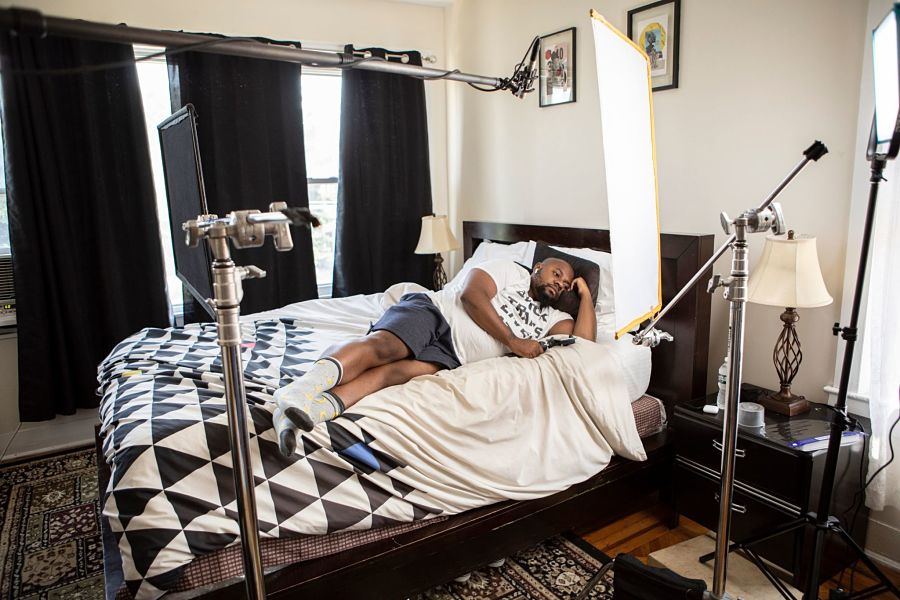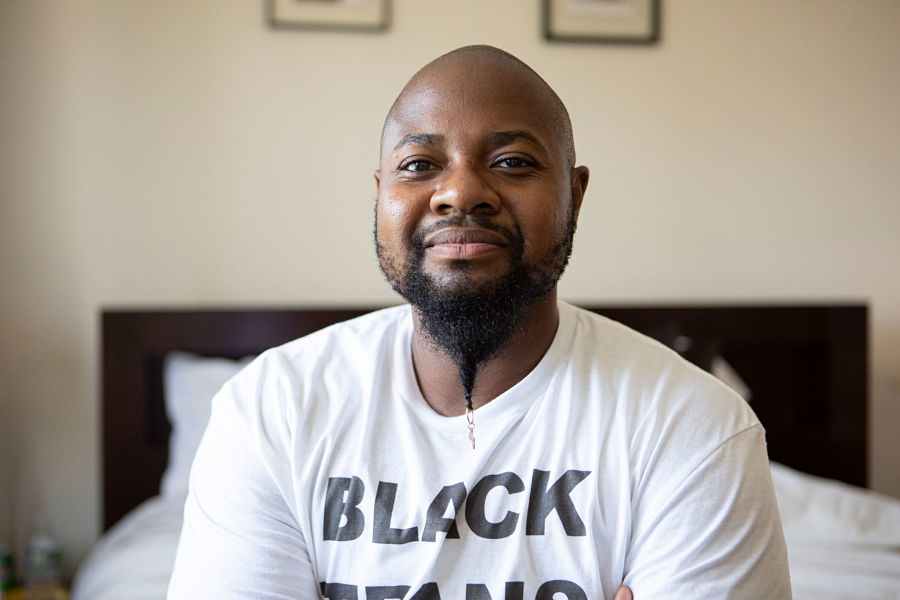Ja’Mel Ashely is not like other actors we usually see in the theatre. Not only is he Black, queer, and trans―he was also born with HIV. But he has defied the odds to carve out his own space in a world that is quadruply hostile to his existence. Though he loves acting, he is also an HIV activist who was hailed as one of POZ Magazine’s top 100 activists for 2019 because of his work advocating for the community.
The Atlanta-based actor also has a specific talent for working every scintilla of a comedic beat. What might register as benign from another performer comes out as slightly naughty, and steeped in pages of background meaning, when he speaks.
That’s a major reason why Donja R. Love wanted to work with him on i need space, a new digital theatre series that Love wrote, directed, and developed. Love is an award-winning Afro-queer playwright who is also living with HIV, and who has dedicated his work to representing Black, queer, and HIV-thriving bodies onstage.
Produced by the New Group, i need space dives into love, loss, and loneliness among a group of friends. Ashely plays Lee, a role that was all but tailor-made for him, not only because he helped to develop the part but because he and Lee share so many commonalities. Far from making the role easier to play, though, this connection has made it one of the hardest acting jobs he’s ever had, he said, because it took him back into his past struggles.
Like himself, Lee is also a Black trans man who has been shunned by his family. One point where their stories diverge, Ashely said: “I was born HIV-positive, whereas Lee contracted HIV throughout his sexual history.” Even so, Ashely added, “Lee’s HIV status reminded me that even though I was born HIV-positive, my family still treats me as if I did something wrong to contract the virus, when the truth is that nobody deserves HIV. For them, that’s also the reason why I’m trans, or why anything that’s bad that’s ever happened to me happened.”
Though Ashely has become used to that stigma, it has not been easy for him to handle. Let’s start with his birth: Upon finding out that Ashely’s mother was pregnant, her cousin prophesied that the baby would bring greatness to the world. But, Ashely said, that after that same cousin discovered that his mother was living with HIV, and that he’d been born with HIV, “He took it back.”
Ashely was raised by his single mother without any support from their family. It was a lonely upbringing, not only because he was an only child but because he was barred from the two megachurches his family owned. “My family has a school that is attached to its church and naturally, I should have gone to it, because that’s where my cousins went,” Ashely said. “But when I was five and trying to get enrolled, they refused to accept me because I had HIV. I was told, ‘What you have means you cannot be successful.’ I have fought against that my entire life, to the detriment of my own well-being.”

Dealing with his family’s neglect was difficult, but neither that obstacle, nor having to survive on his own as an orphan after his mother passed when he was 15, was enough to keep him down. During those years, Ashely lived with the families of different friends until he graduated from high school. He says that what helped keep him going was his grandmother’s love, as well as becoming a junior counselor at Camp Heartland, a summer camp that provides children living with HIV a safe haven from stigma, when he turned 16.
“Growing up, if I told one of my friends that I had HIV, everything would be fine until their parents found out,” Ashely recalled. “The next day everything would not be okay. So to be in a place where no one gave a damn about this virus in my body, or made fun of the ways I took my medication, or stopped me from swimming in a pool with others, or panicked if I got a cut, was healing. That showed me that I belonged in the world.”
That’s another reason why participating in i need space has been so valuable to Ashely. Just as Camp Heartland provided him with a place to thrive as a teenager, Love’s new series is giving a platform to share his talent and to serve as a possibility model for other Black trans men, as well as anyone living with HIV.
Ashely recently spoke to American Theatre about the upcoming series and about representing marginalized communities.
AMERICAN THEATRE: What have been the struggles of working in an industry where you don’t fit into predetermined boxes?
JA’MEL ASHELY: There are many people who have paved the way for others to stand in their truth, and there are times when I’ve felt like I’ve had to be the living martyr in my identity so that others could be themselves. Even here in the theatre, where so many people come to feel safe, there is still a replication of misogyny, homophobia, and HIV stigma. That takes a toll on people and forces them to live on the down-low―to hide.
But I’ve never wanted to do that, so I’ve been open with calling people in and sharing my status. It’s been lonely at times, but I’ve committed myself to pushing through, and I’m grateful that there’s a possibility that being seen will help others to come through with who they are.
How does it feel to portray someone whose experience is a cousin to your own?
It’s like singing a song; it’s not the same tune, but we can harmonize. Lee is estranged from his family because of his HIV status, and that influences why he puts up with so much of his best friend Mark’s stuff. As part of my background work, I called my Pop Pop, who I haven’t had a good relationship with since I was 15 years old, and was reminded why I don’t speak to him anymore.
Looking at that helped me to tap into why so many of us hold onto people who harm us. For Lee, I decided it is because Mark was there for him before and after his transition. Being trans, it connects you to who you were before you blossomed into who you are.
Is that what makes this part special compared to other characters you’ve portrayed?
Yes. Lee stands in his identity as both trans and living with HIV. It’s a very non-stereotypical role, compared to what is available for trans men right now. And that’s huge not only for the community but for writers because it helps them understand that we look like more than one thing and that we are more than who we’re sleeping with or our genitalia. We are just like anyone else, and while that’s easy to say, sometimes people can’t believe it until they see it.
How does it feel to know that your character will be visible to audiences all over the world, even in communities where people don’t feel safe with living their lives openly?
Let me answer this way: When you don’t get a role, people often say that it’s because you didn’t fit what the producers had in their heads. So to be the vision of what this team wanted was beyond touching. It means a lot that somebody wanted me to portray a character who was more than what only 5 percent of people can physically or mentally relate to.
That’s part of what makes digital theatre so important. If i need space was playing at a theatre, even if it was Off-Broadway, maybe 100,000 would see it. But with this platform, there’s a chance that we’ll reach millions of people. I hope that everyone who watches is able to see themselves in me―that they can be Black, queer, a trans man, living with HIV, and still be successful. That’s what I’m here for: to be a living embodiment of someone who has blocked the noise of the world and decided it is valuable to chase their visions and dreams. Because I am enough and so are they.
The series i need space will begin on Tues., March 8, on Broadstream.
Juan Michael Porter II (he/him) is an arts and culture journalist. He has written for TheBody.com, PBS, San Francisco Chronicle, Christian Science Monitor, New York Observer, TDF Stages, Time Out NY, and Playbill. He is a 2020 National Critics Institute and 2021 Poynter Power of Diverse Voices fellow.
This piece initially misspelled Ashely’s name as “Ashley.”


